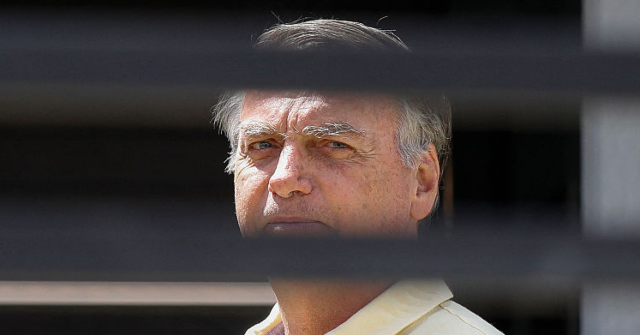Brazil’s Supreme Federal Tribunal (STF) on Thursday convicted conservative former President Jair Bolsonaro and sentenced him to 27 years and 3 months prison for his alleged role in a “failed coup attempt,” marking the first time that a former president of Brazil is convicted for “crimes against democracy.”
Bolsonaro, and six other individuals designated by the STF as the “Core 1” of the alleged coup plot — were found guilty of “attempted violent abolition of the democratic rule of law, coup d’état, participation in an armed criminal organization, aggravated damage, and deterioration of listed heritage sites.” Bolsonaro and the six other individuals were sentenced by a panel of five STF Justices composed of the case’s rapporteur, Alexandre de Moraes, and Flávio Dino, Luiz Fux, Cármen Lúcia, and STF President Cristiano Zanin.
Justice Fux was the only justice who voted to acquit Bolsonaro, having cast his vote at the end of a lengthy 15-hour session on Wednesday. Both de Moraes and Dino cast their votes to convict Bolsonaro this week, leaving Lúcia and Zanin for Thursday. A three out of five majority was required to either convict or acquit Bolsonaro and all others accused.
According to the STF, Bolsonaro allegedly conspired with a broader group of over 30 individuals to stage a “coup” and overturn the results of the controversial 2022 presidential election. Bolsonaro, at the time the incumbent president, narrowly lost against current radical leftist President Luiz Inácio Lula da Silva, who is now serving his third term.
Justice Lúcia, who voted to convict Bolsonaro alongside Zanin in Thursday’s court session, argued that, since 2021, a “social and political environment conducive to sowing the seeds of anti-democracy” was cultivated in Brazil with the aim of “breaking” Brazil’s democratic cycle which, according to the justice, aimed at “inciting the population,” leading to the events of the January 8, 2023 riots.
“January 8, 2023, was not a trivial event after a Sunday lunch, when people went out for a stroll,” she said.
Lúcia asserted that Brazil’s prosecutor general “proved the existence of a criminal organization, led by then-President Jair Bolsonaro, which implemented a progressive and systematic plan to attack institutions in order to undermine the alternation of power and undermine the free exercise of constitutional powers, especially the judiciary.”
According to Lucia, the alleged organization included “a digital militia that propagated attacks on the electoral system and electronic voting machines.”
“The attempt to abolish the democratic rule of law and the attempted coup d’état make it clear that this is an attempted crime, because if it had been carried out, we would not be here to judge it,” Lúcia said.
The “coup” trial is the larger of a lengthy list of judicial actions against Bolsonaro and his family after he left office in January 2023 — most of which have been ordered by de Moraes. In addition to the prison sentence, Bolsonaro, 70, will reportedly receive a new eight-year ban from public office at the end of his 27-year sentence as per the terms of Brazilian’s Clean Slate laws — effectively ending his political career. Bolsonaro’s legal team may file an appeal to the STF before he starts serving the sentence.
Former President Bolsonaro is legally unable to issue public comments on his conviction as per the terms of a highly restrictive house arrest in late August that prohibits him from utilizing social media or using any kind of phone device.
Bolsonaro’s legal team immediately announced that it will contest the conviction all the way to international courts such as the Inter-American Court of Human Rights, alleging violations of fundamental rights and due process in the trial against the former president. CNN Brasil pointed out that in the event of such a scenario, the conviction “would not be suspended, but Brazil could be held accountable by multilateral organizations.”
U.S. Secretary of State Marco Rubio condemned the sentencing in a social media post.
“The political persecutions by sanctioned human rights abuser Alexandre de Moraes continue, as he and others on Brazil’s supreme court have unjustly ruled to imprison former President Jair Bolsonaro,” Sec. Rubio wrote. “The United States will respond accordingly to this witch hunt.”
The Brazilian government, through its Foreign Ministry, responded to Sec. Rubio in a three-part social media post claiming that Sec. Rubio’s “threats” to attack Brazilian authorities ignore “the facts and compelling evidence in the case files, will not intimidate our democracy”:
Mauro Cid, Jair Bolsonaro’s former aide-de-campe and the “whistleblower” in the coup case against Bolsonaro, was sentenced to two years imprisonment under “open conditions.” According to reports from Brazilian outlets, Cid intends to move to the United States and “reunite with his family” after serving his sentence in Brazil.
In late July, President Donald Trump cited the political persecution of Bolsonaro in an executive order identifying Brazil as a national security threat to the United States, imposing a 50 percent tariff on Brazilian goods entering the U.S. At the same time, Alexandre de Moraes, a self-styled “anti fake news” crusader with an extensive track record of censoring and persecuting conservative figures in Brazil, was targeted with U.S. human rights sanctions under the Global Magnitsky Act.
Christian K. Caruzo is a Venezuelan writer and documents life under socialism. You can follow him on Twitter here.















